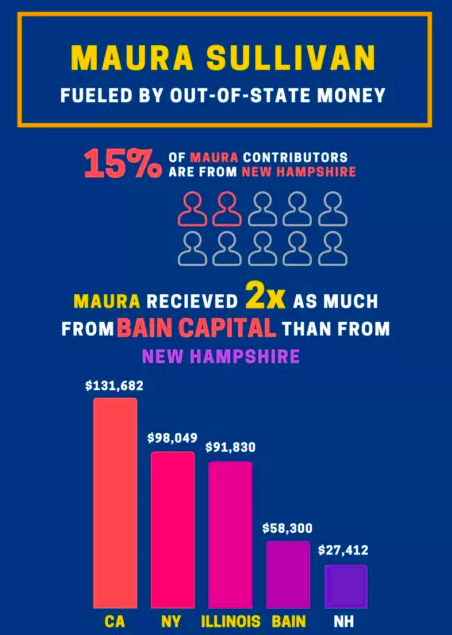Is Maura Sullivan trying to “buy” the First Congressional District seat with out-of-state cash? That’s the contention of Chris Pappas, one of her fellow Democrats running to replace Rep. Carol Shea-Porter.
Sullivan’s second-quarter campaign disclosures give her a huge lead in the cash-on-hand numbers, with more than $1 million in the bank from a total of $1.5 million raised during the campaign. The former Obama administration official raises$604,000 in the second district alone. No other candidate on either side of the aisle is even close in the cash race.
While many N.H. politocos considerExecutive Councilor Chris Pappas the front-runner in this primary, his campaign raised a modest $240,ooo in the second quarter and has about $440,000 in cash on hand. No other Democrats are at the $100,000 cash-on-hand threshold.
As a result, Sullivan’s opponents are making a campaign issue out of the fact that the vast majority of her money has come from out-of-state sources. While the details of her donors in the second quarter haven’t been released, about 20 percent of her previous donations came from New Hampshire donors. And that, her opponents argue, is a problem.
“This seat is not for sale,” Pappas’s campaign manager, Kari Thurman said after the fundraising numbers were released. ”No candidate should be using the people of the first district to punch their ticket to Washington.”
Pappas himself has suggested that “big outside special interest groups may want to buy this seat” (an obvious reference to Sullivan), but that the voters of New Hampshire “will have the final say.” His campaign has proposed the “Homegrown Campaign Pledge,” urging all candidates to commit to having Granite Staters make up the majority of their campaign donors.
The progressive activists of NH Labor News (“Where Labor And Public Politics Intersect”) have gone even further. In a post entitled “Maura Sullivan Is Bringing in Boatloads of out of State Cash From Multiple Wall Street Companies.” they accuse Sullivan’s campaign of being “fueled by out-of-state money,” in particular cash from Bain Capital–Mitt Romney’s old firm. They note that in her first two quarters combined, “Sullivan raised more money from Bain Capital than she received from New Hampshire residents.”
Add the fact that Sullivan reportedly “mulled multiple congressional districts” in states like Illinois and Virginia before moving to New Hampshire and entering the race, these out-of-state campaign sourced feed the narrative that she’s the “hand-picked candidate of the D-triple-C” (the Democratic Congressional Campaign Committee) as one longtime Democrat told NHJournal.com.
This in-fighting over out-of-state financing is worrying to some Granite State Democrats. State Sen. Martha Fuller Clark released a statement urging “let’s not attack any of our fellow Democratic candidates for raising the necessary dollars in order to be successful in November.”
“The way some Democrats are attacking other Democratic candidates for raising money outside of the state is most unfortunate and detracts from the positive campaign we want from all our Democratic candidates,” Clark said. “Because there are only 7 weeks between the primary and the general election on November 6th, those Democrats that prevail in our September 11th primary must be able to launch a major winning campaign the very next day, September 12th. That is why all Democratic candidates running for Governor or the 1st Congressional District must raise as much money as they can now, both in state and out of state.”
Will New Hampshire voters care where the funding comes from for the TV ads they see leading up to the September primary? Will primary voters who’ve been so willing to back progressive women candidates in other states withhold their votes over the carpetbagger issue?
Given the choice of having the money and being attacked over it vs. being outspent and making the attacks, most campaign pros would much prefer the former to the latter.


